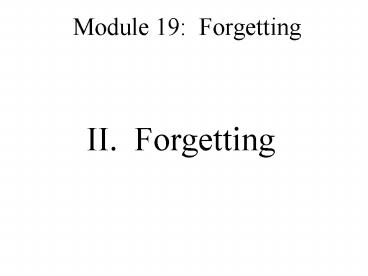II' Forgetting PowerPoint PPT Presentation
Title: II' Forgetting
1
II. Forgetting
- Module 19 Forgetting
2
A. Encoding Failure
- Occurs when information does not go into memory
because it is unimportant, unnecessary, or the
brain has lost the ability to encode
3
Which is the Right Penny?(From Nickerson
Adams, 1979)
4
Which is the Right Penny? (From Nickerson
Adams, 1979)
5
B. Storage Failure
- Module 19 Forgetting and Memory Construction
6
1. Hermann Ebbinghaus (1850-1909)
- Developed the forgetting curve, or Ebbinghaus
curve, which states that how well we remember
information depends on how long ago we learned it
7
The Forgetting Curve(Adapted from Ebbinghaus,
1885)
8
C. Retrieval Failure
- Module 19 Forgetting and Memory Construction
9
1. Interference when one memory blocks another
- Proactive interference An older memory disrupts
a newer memory - Retroactive interference A newer memory
disrupts an older memory
10
2. Motivated Forgetting
- Module 19 Forgetting and Memory Construction
11
a) Repression Freuds concept of moving
anxiety-producing memories to the unconscious
- Supposed means of protecting oneself from painful
memories
12
3. Memory Construction
13
a) The Misinformation Effect
- Unintentionally adding misleading info into ones
memory of an event - Elizabeth Loftus (1944- ) Found that
subjects memories varied based on the wording of
questions
14
b) Childrens Recall
- Children are very open to suggestions
- Research has shown childrens testimony to be
unreliable - Ex Some therapists use techniques that increase
the likelihood a patient will construct a false
memory of childhood sexual abuse.
15
Accurate Interviewing Methods
- To promote accuracy with childrens testimony the
interviewer should - Phrase questions in a way the child can
understand - Have no prior contact with the child
- Use neutral language and do not lead or suggest
answers
16
Shy Droopy Dopey Sniffy Wishful Puffy Dumpy Sneezy
Lazy Pop
Grumpy Bashful Cheerful Teach Shorty Nifty Happy D
oc Wheezy Stubby
WHO ARE THE 7 DWARFS?
Grouchy Gabby Fearful Sleepy Smiley Jumpy Hopeful
17
The End
PowerShow.com is a leading presentation sharing website. It has millions of presentations already uploaded and available with 1,000s more being uploaded by its users every day. Whatever your area of interest, here you’ll be able to find and view presentations you’ll love and possibly download. And, best of all, it is completely free and easy to use.
You might even have a presentation you’d like to share with others. If so, just upload it to PowerShow.com. We’ll convert it to an HTML5 slideshow that includes all the media types you’ve already added: audio, video, music, pictures, animations and transition effects. Then you can share it with your target audience as well as PowerShow.com’s millions of monthly visitors. And, again, it’s all free.
About the Developers
PowerShow.com is brought to you by CrystalGraphics, the award-winning developer and market-leading publisher of rich-media enhancement products for presentations. Our product offerings include millions of PowerPoint templates, diagrams, animated 3D characters and more.

